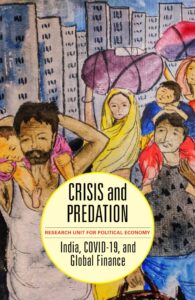Crisis and Predation: India, COVID-19, and Global Finance
REVIEWS, 7 Dec 2020
Research Unit for Political Economy | Monthly Review - TRANSCEND Media Service
FREE EBOOK OFFER
Nov 2020 issue – With the advent of COVID-19, India’s rulers imposed the world’s most stringent  lockdown on an already depressed economy, dealing a body blow to the majority of India’s billion-plus population. Yet the Indian government’s spending to cushion the lockdown’s economic impact ranked among the world’s lowest in GDP terms, resulting in unprecedented unemployment and hardship. Crisis and Predation shows how this tight-fistedness stems from the fact that global financial interests oppose any sizable expansion of public spending by India, and that Indian rulers readily adhere to their guidance. The authors reveal that global investors and a handful of top Indian corporate groups actually benefit from the resulting demand depression: armed with funds, they are picking up valuable assets at distress prices. Meanwhile, under the banner of reviving private investment, India’s rulers have planned giant privatizations, and drastically revised laws concerning industrial labor, the peasantry, and the environment—in favor of large capital.
lockdown on an already depressed economy, dealing a body blow to the majority of India’s billion-plus population. Yet the Indian government’s spending to cushion the lockdown’s economic impact ranked among the world’s lowest in GDP terms, resulting in unprecedented unemployment and hardship. Crisis and Predation shows how this tight-fistedness stems from the fact that global financial interests oppose any sizable expansion of public spending by India, and that Indian rulers readily adhere to their guidance. The authors reveal that global investors and a handful of top Indian corporate groups actually benefit from the resulting demand depression: armed with funds, they are picking up valuable assets at distress prices. Meanwhile, under the banner of reviving private investment, India’s rulers have planned giant privatizations, and drastically revised laws concerning industrial labor, the peasantry, and the environment—in favor of large capital.
And yet, this book contends, India could defy the pressures of global finance in order to address the basic needs of its people. But this would require shedding reliance on foreign capital flows, and taking a course of democratic national development. This, then, is a pursuit, not for India’s ruling classes, but a course of struggle for India’s people.
********
In this sharply and clearly written book, our Indian comrades at The Research Unit for Political Economy examine India’s response to COVID-19 through the lens of the nation’s ever-growing dependence and subservience to foreign capital.
The book is an in-depth study of the Indian economy in the post-Covid situation and its place in global finance, with both a strong conceptual apparatus and a solid empirical base. Why does the government refuse to release the huge stock of 77 million tons of food grains for the public distribution system when India ranks even lower than some of the poorest Sub-Saharan countries in its hunger index? The answer seems to be that the government has chosen a path of willing dependence on the United States. I would recommend the book strongly to anybody interested in understanding the tentacles that bind developing countries to US capital, and how to move on to a path of democratic economic and social development.
A pandemic such as this should evoke a response of human feeling, and yet it seems to evoke—in the capitalist world—the reverse. There is disdain for suffering and an intensification of warlike behaviour. India’s government offers an example, and this book lays out the evidence: it must be read by those who want to struggle towards human betterment rather than human misery.
__________________________________________
, based in Mumbai, India, publishes the journal Aspects of India’s Economy and a range of research publications in English, Hindi, and other Indian languages.
Tags: COVID-19, Coronavirus, India, Lockdown, Reviews
DISCLAIMER: The statements, views and opinions expressed in pieces republished here are solely those of the authors and do not necessarily represent those of TMS. In accordance with title 17 U.S.C. section 107, this material is distributed without profit to those who have expressed a prior interest in receiving the included information for research and educational purposes. TMS has no affiliation whatsoever with the originator of this article nor is TMS endorsed or sponsored by the originator. “GO TO ORIGINAL” links are provided as a convenience to our readers and allow for verification of authenticity. However, as originating pages are often updated by their originating host sites, the versions posted may not match the versions our readers view when clicking the “GO TO ORIGINAL” links. This site contains copyrighted material the use of which has not always been specifically authorized by the copyright owner. We are making such material available in our efforts to advance understanding of environmental, political, human rights, economic, democracy, scientific, and social justice issues, etc. We believe this constitutes a ‘fair use’ of any such copyrighted material as provided for in section 107 of the US Copyright Law. In accordance with Title 17 U.S.C. Section 107, the material on this site is distributed without profit to those who have expressed a prior interest in receiving the included information for research and educational purposes. For more information go to: http://www.law.cornell.edu/uscode/17/107.shtml. If you wish to use copyrighted material from this site for purposes of your own that go beyond ‘fair use’, you must obtain permission from the copyright owner.